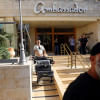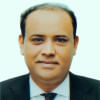Saw all, heard all; what will we do?

All the Prime Minister's Men Tuesday reminded readers, to some extent, of All the President's Men, a book based on epic investigative journalism that revealed the Watergate scandal of President Richard Nixon.
The word "Prime Minister" replaces "President"; the year is 2021, not 1972, the government machinery involved is Bangladesh's, not the US', and it's the investigative report of Doha-based news channel Al Jazeera, not of The Washington Post in America, that went on to rock a government.
The target character of the two stories is similar: a mighty official, who is found to be abusing the government power and going beyond the line of law to sponsor or get involved in criminal activities. The US President was found guilty of trying to cover up a crime and Bangladesh character is accused of corruption.
Comparison is grossly unfair to make in a haste and without seeing the full evidence. Yet, if we have to quickly compare the two reports, we can safely conclude that All the President's Men thrived on the strength of evidence and All the Prime Minister's Men on sensationalising of evidence.
All the President's Men was the famous work by legendary journalists Bob Woodward and Carl Bernstein for The Washington Post in 1972 that effectively proved the involvement of President Richard Nixon in the scandal and that eventually saw his back from the White House. That clinical work dominated headlines of the American and global media for years, led to the making of a critically-acclaimed movie and continues to inspire young investigative journalists across the globe till today.
By contrast, it was all quiet on Bangladesh front upon the airing of All the Prime Minister's Men. Some global media went gaga over it, yet the Bangladesh media heard no evil, saw no evil, spoke no evil. The government imposed no censorship, but the media possibly chose to be influenced by late Ugandan dictator Idi Amin, who once said, "There is freedom of speech, but I cannot guarantee freedom after speech."
So, any attempt now to do a quality assessment of the report we did not publish could be called into question. Yet, at the risk of being levelled as morally disqualified, let's make an attempt. The Al Jazeera report -- "Gang close to Bangladesh PM extracts bribes for state contracts" -- could not prove beyond doubt that they're premier's men and that they're "profiting from links to PM Sheikh Hasina". Claims of the criminals were included to prove their closeness to Bangladesh PM. Those claims could as well be the typical trick of any criminal to prove their worth.
A title like "All the Chief's Brothers" or "The Mafia brothers" could have been more fact-based. And, as it appeared from the one-hour 20-minute reportage, it would have been journalistically appropriate had the report left out the innuendoes and assumptions, sticking instead to its core findings against three murder-convicted brothers -- two fugitives and one pardoned from death row -- who're profiting from the connection of fourth brother's office with security forces and boasting about alleged blessings of the Bangladesh premier.
Sensationalising apart, it goes without saying what Al Jazeera did through an investigation of two years across continents and with the help of high-tech surveillance is an eye-opener, demonstrating once more the power of investigative journalism. It's opened up a Pandora's Box, to which the government has reacted as well by terming it "apparently a politically motivated smear campaign by notorious individuals associated with the Jamaat-e-Islami extremist group."
But this wholesale denial of the sensational disclosures can turn out to be way too costly for the nation and doing more harm than good to the government in the end. A responsible response to any media disclosures would be: take in the facts and leave out the fictions.
Now, what are the facts that All the Prime Minister's Men provided?
A defence purchase of highly controversial listening device, hiding in the deal the country of origin- Israel, a country that Bangladesh has neither recognised nor allowed its citizens to travel, was helped manage by the company of one fugitive brother. A national identity card and a passport were obtained by that fugitive brother exploiting the links at his brother's office in security forces.
A release from the ISPR (Inter Service Public Relations Directorate) quickly binned the report, stating that (it was) "concocted and ill-intended report by a vested group in the news channel Al-Jazeera." Still, serious investigations are more than required. If found true, the government must rush to fix the system and restore the reputation the disciplined forces are known for. A mere rebuttal to the Al Jazeera report is just not enough.
Two fugitive brothers and the pardoned one flew into Dhaka and partied at a gala marriage ceremony of big brother's son right in front of the police authority's nose. The two murder convicts are still most wanted by the home ministry, and what made them "see nothing, hear nothing" should be a subject of serious investigation by the government.
There is disturbing boasting by a fugitive brother and Al Jazeera claims that suggested that systematic corruption by top law enforcement officials is going on in full scale and money is being laundered with blessings from a few political leaders in power. Days back, Bangladesh was ranked second-worst in South Asia in Transparency International's corruption index. Our Anti-Corruption Commission can care to look into the report.
We must commend the government for not trying to block the viewing of Al Jazeera report in Bangladesh. In the age of technology, such measures do not work anymore.
The government saw it all and heard it all. Will it do something at all? That's the big question.

 For all latest news, follow The Daily Star's Google News channel.
For all latest news, follow The Daily Star's Google News channel. 








Comments